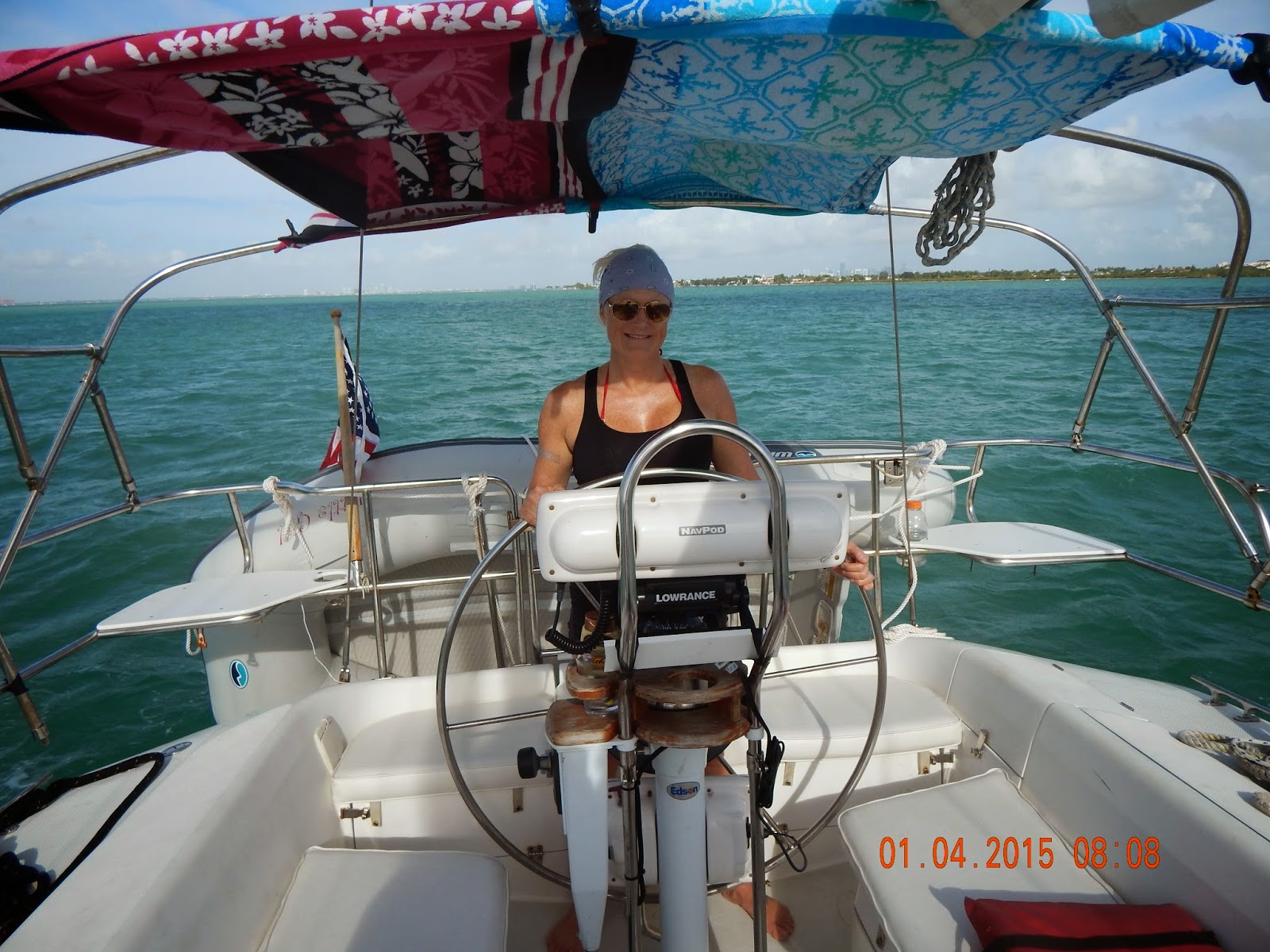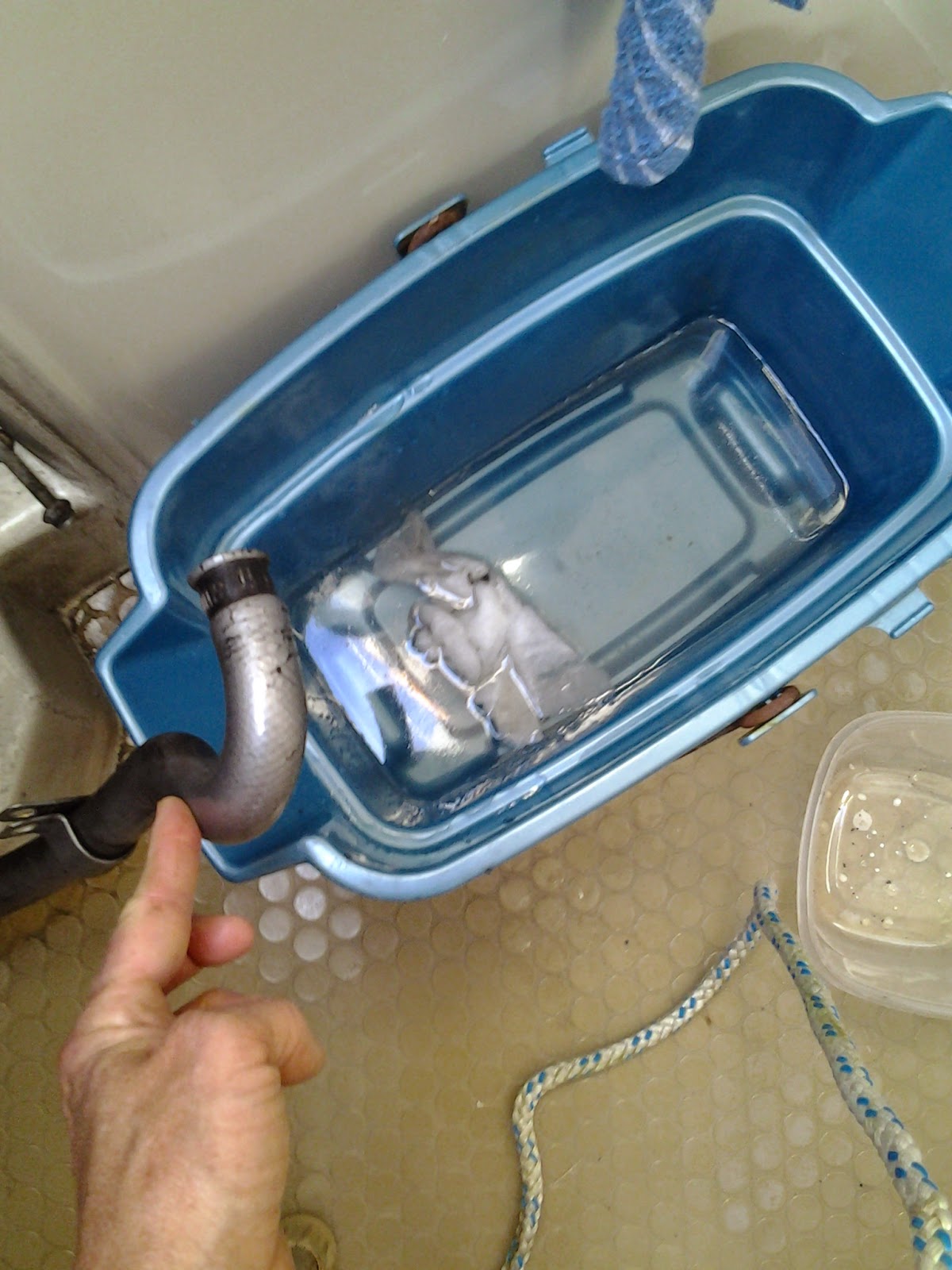So, we bought the boat sight unseen. In other words, we did a TON of research (including
hiring a marine surveyor to inspect the boat), but we still hadn’t seen it with
our own eyes.
Let’s go back. With
the internet now, it’s amazing what you can find if you invest some time in
looking. We were pretty well “set” on
the particular boat model we wanted.
With the internet, we were able to scour Craigslist Ads worldwide, boat
brokerage listings everywhere, repo reports,, etc. From there, we requested pictures and “stories”
from the sellers. And from there, we
were able to start making some “low” offers.
On the third attempt, we hit the jackpot . . . . a boat that
“seemed” perfect at an incredible price.
Next step was signing and faxing
paperwork, wire transferring the money (gulp) and hiring the surveyor.
All that went through without a hitch . . . but actually SEEING the boat ourselves was
still scary. The scorecard looks sort of like this:
·
Pleasant surprises 90%
·
Bad surprises 10%
All in all, we think that’s pretty good. Here are a few more details:
1.
It DID have a complete (and nice) Dodger and
Bimini – both the frame and the canvas were included. This is HUGE. In our previous trip across the open ocean
and buzzing around the Bahamas, we got absolutely BAKED by the sun. We will now have some protection from the
brutal sun’s rays, waves that come up and over the bow, and rain. Excellent surprise. But (see #2 below) . . . .
Mark at the helm. The bimini frame but no canvas. We are able to tie our dinghy "Little Girl" to the back rail sitting on the swim platform. There is a davit system on board that we will need to reassemble at some point.
I put our swim towels up on the bimini frame for some sun protection while under way.
Mark at the helm. The bimini frame but no canvas. We are able to tie our dinghy "Little Girl" to the back rail sitting on the swim platform. There is a davit system on board that we will need to reassemble at some point.
2.
The zippers on the bimini and dodger were both
completely shot. The zipper teeth fell off like dandruff when we tried to zip them up. So, we brought them home with us and will
have a local sailmaker put new zippers in.
3.
The cushions (both inside and for the cockpit)
were in GREAT condition. None of them
need replacing or repairing.
4.
The boat is equipped with TONS of nice things
(luxuries???):
a.
Air Conditioning – great when hooked to shore
power.
b.
Freezer and Refrigerator --- a WONDERFUL upgrade. Although we did kind of learn the hard way
about how much battery juice this sucks up.
Note to self >>>> look at solar panels or wind generator
before next trip! Lol
c.
Windlass winch for pulling up long anchor rodes
(ropes). We didn’t actually need to
use this on our shakedown trip because we were always in (very) shallow water. However, the anchor chain was highly rusted and corroding. I was able to cut out some of those bad links and tie them back together with some spare halyard.
Mark is at the anchor locker removing some links so that we can continue to use the Bruce anchor.
Mark is at the anchor locker removing some links so that we can continue to use the Bruce anchor.
d.
Overhead halogen lights everywhere. NICE
lighting for sure. BUT, like the
refrigerator, we learned that they draw a LOT more electricity from our
batteries than our little LED lights we had on New girl. Note to self >>>>> find LED
replacement light bulbs before the next
trip.
e.
A head (bathroom) with a door and room to actually
turn around. In fact, you do NOT have
to back into the room to “do your business”.
Wow, such convenience.
f.
A hot water heater that uses the engine
circulation to heat the water.
Excellent. Although we discovered
that the High Temp Relief Valve was “tripping” and draining all of our potable
water when it got hot, so we’ll need to replace that valve (soon).
5.
The head sail (Jib) is completely shot. When we were offshore one day (22 knots of wind),
it ripped out completely – from top to bottom.
Kind of strange thing because most
of the sail is in GREAT – wonderful shape.
It’s only the trailing (back) edge, also called the “leech”, for about
24” that is terrible. It is so UV damaged that you can rip it with your bare
hands, like tissue paper. We consulted with our sailmaker friend back
home via cell phone and he thinks that someone used the roller furling “backwards”
and rolled up the sail without the UV cover protection exposed. Kind
of stupid, but perhaps that is what damaged it.
In any case, it looks like we’re now in the market for a new head
sail! This one is a costly “ouch”.
6.
Engine performance. The engine, a 3 cylinder Yanmar diesel,
starts and runs GREAT. It’s amazing. It
just purrs along. We ended up running
it about 60 hours overall and used under 20 gallons of fuel. That’s less than ½ gallon per hour. We’re thinking that is pretty good “mileage”!
7.
Engine cooling. We DID have some serious trouble
with the engine overheating. One of
those times, we were offshore in fairly
heavy seas and heading through a very narrow “cut” to get inside the barrier
reefs. This was a TERRIBLE place for an
engine problem. Well, we got sails back
up and Shawnae tacked back and forth while I played mechanic. After some online troubleshooting (on my
phone), I isolated the problem to the seawater pump. It was impossible to work on this while
bouncing around offshore so we came through the cut (Angelfish Creek) under
sail. That worked well -phew. Once at anchor, I essentially rebuilt the
water pump and it functioned well thereafter.
However, we still nervously check the engine temp gauge frequently
whenever the motor is on.
This is the water pump cover that I scrubbed clean with a copper scrubbie.
It is always good to have silicone lube on board!
Testing to see if the sea water would pump through. Eventually it did!
This is the water pump cover that I scrubbed clean with a copper scrubbie.
It is always good to have silicone lube on board!
Testing to see if the sea water would pump through. Eventually it did!
8.
Engine alternator. We had some difficulty with the battery usage. In No Name Harbor, we were fortunate to be
anchored next to an Electrical engineer – a nice guy named Jim Toups. In addition to giving me a “jump start”, he
helped me troubleshoot the charging system and we discovered that the
alternator IS indeed charging the batteries, just at a very slow rate. So, I think a high output alternator and new
regulator is probably on our shopping list too.
9.
Stability – this new boat is 100% more stable
and feels to be much more seaworthy. It
handles the heavier winds, gusts, and waves, wonderfully. I think this is partially because it’s so
much bigger and heavier than New Girl, but also because marine design has
improved and gotten more sophisticated from 1973 to 2001. In any case, we are delighted with the
performance.
10.
Spare parts – we had purchased a number of spare parts (fuel
filters, pump impellers, etc.) but every single part we bought was wrong! We had used information we were given to
buy those parts ahead of time. And
unfortunately, that was wrong.
Fortunately we didn’t need them.
But now at least we know the correct model numbers for those parts we
need to keep on board.
11.
Fuel gauge doesn’t work. This was pretty scary at first because when
we motored away from the boat broker’s dock, we had no idea if we had an ounce
of fuel or 10 gallons on board. It turns
out that we had plenty. We also filled
up right away and carried a full fuel jug on board thereafter too. I
replaced the gauge – still nothing, so it’s probably the sending unit. This will be hard to replace, because it
involves opening up the top of the fuel tank . . . . which is pretty much
inaccessible deep in the bilge!
So, all in all, we had a successful “shakedown cruise”. Some was good and some not so good. But we feel confident that we now KNOW the
boat and how the various systems operate. Things on a boat are ALWAYS in the state of
breaking down and being repaired – probably more so than any other
environment. But it is good to know
where things stand at this point.
Stay tuned for MORE surprises along the way.
Nice wide decks with the shrouds being toward the inside so that we can walk around. This was a big deciding factor when getting this boat.
The paddleboards can hang nicely on the outside of the lifelines so that we are still able to move about freely on the decks. They do not get in the way of the head sail either. This was really nice.
The sails looked great when we first raised them.
This is the headsail a few days before it started to rip.
The next day we put Mark's SUP on the outside of the lifelines to port. His is about 5' longer than my board so we weren't sure if it would work. It did though. That worked very nicely.
Fair winds to you all!
Nice wide decks with the shrouds being toward the inside so that we can walk around. This was a big deciding factor when getting this boat.
The paddleboards can hang nicely on the outside of the lifelines so that we are still able to move about freely on the decks. They do not get in the way of the head sail either. This was really nice.
The sails looked great when we first raised them.
This is the headsail a few days before it started to rip.

















No comments:
Post a Comment